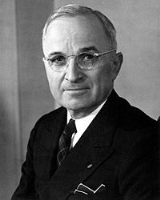
1947 Cold War: in an effort to fight the spread of Communism, U.S. President Harry S. Truman signs an act into law that will later be called the Truman Doctrine. The act grants $400 million in military and economic aid to Turkey and Greece, each battling an internal Communist movement.
1947 Cold War: U.S. President Harry S. Truman signs the National Security Act of 1947 into United States law creating the Central Intelligence Agency, United States Department of Defense, Joint Chiefs of Staff, and the United States National Security Council.
1947 The first televised White House address is given by U.S. President Harry S. Truman.
1948 President Harry S. Truman signs the Marshall Plan, authorizing $5 billion in aid for 16 countries.
1948 U.S. President Harry S. Truman issues a peacetime military draft in the United States amid increasing tensions with the Soviet Union.
1948 U.S. President Harry S. Truman signs Executive Order 9981 desegregating the military of the United States.
1949 Point Four Program a program for economic aid to poor countries announced by United States President Harry S. Truman in his inaugural address for a full term as President.
1949 U.S. President Harry S. Truman signs the National Security Act Amendment, streamlining the defense agencies of the United States government, and replacing the Department of War with the United States Department of Defense.
1950 President Harry S. Truman announces a program to develop the hydrogen bomb.
1950 Puerto Rican nationalists Griselio Torresola and Oscar Collazo attempt to assassinate US President Harry S. Truman at Blair House.
1950 U.S. President Harry S. Truman declares a state of emergency, after Chinese troops enter the fight with communist North Korea in the Korean War.

